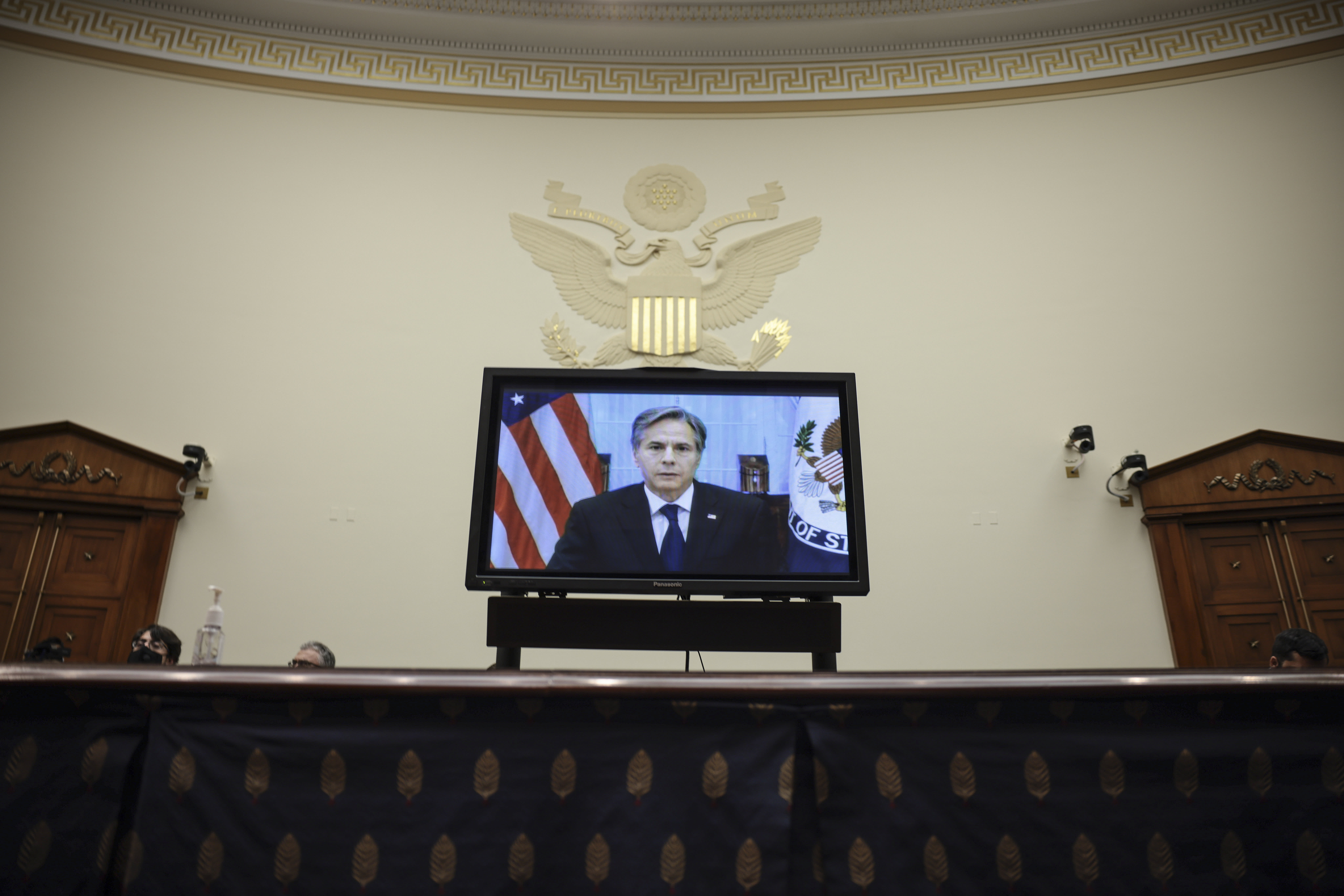
U.S. Secretary of State Antony Blinken testifies virtually in a House Foreign Affairs Committee on Capitol Hill on September 13, 2021 in Washington, DC.
Anna Moneymaker | Getty Images
WASHINGTON — Secretary of State Antony Blinken said during a contentious congressional hearing Monday that the Taliban is Afghanistan’s de facto government, a statement that marks the apparent end of a Western attempt to create a stable democracy in the war-weary country.
“It [the Taliban] is the de facto government of Afghanistan. Those are just the facts,” Blinken told the House Committee on Foreign Affairs when asked if the administration recognized the Taliban as a legitimate government.
“This is the product, alas, of one side getting the upper hand in a civil war,” the nation’s top diplomat added.
During the three-hour hearing, Blinken defended the Biden administration’s withdrawal of U.S. troops from Afghanistan. He was told by at least three Republican lawmakers during the hearing that he should resign.
“We made the right decision in ending America’s longest war,” Blinken said in an emotional response.
“We made the right decision in not sending a third generation of Americans to fight and die in Afghanistan. We did the right thing by our citizens and working feverishly to get every one of them out. We did the right thing by 125,000 Afghans, but to bring them to safety, and now we’re working to do the right thing to hold the Taliban to the expectations of the international community to ensure people can continue to travel freely, to ensure that the rights of Afghans are upheld,” he said.
Chairman Gregory Meeks (D-NY) (2nd-L) speaks at House Foreign Affairs Committee hearing with U.S. Secretary of State Antony Blinken on Capitol Hill on September 13, 2021 in Washington, DC.
Anna Moneymaker | Getty Images
Earlier this month, reporters pressed Secretary of Defense Lloyd Austin on whether the U.S. would recognize the Taliban as the legitimate government of Afghanistan.
“It’s hard to predict where this will go in the future with respect to the Taliban,” Austin said during a press briefing Sept. 1.
“We don’t know what the future of the Taliban is,” Gen. Mark Milley, chairman of the Joint Chiefs of Staff, said alongside Austin.
“I can tell you from personal experience that this is a ruthless group from the past and whether or not they change remains to be seen,” Milley said, adding that he and Austin both fought against the group during their military careers.
Secretary of Defense Lloyd Austin and Chairman of Joint Chiefs of Staff Gen. Mark Milley participate in a news briefing at the Pentagon July 21, 2021 in Arlington, Virginia.
Alex Wong | Getty Images News | Getty Images
The U.S. began its war in Afghanistan in October 2001, weeks after the attacks of Sept. 11. The Taliban at the time provided sanctuary to al-Qaeda, the group that planned and carried out the devastating terrorist attacks on the World Trade Center and the Pentagon.
Since then, about 2,500 U.S. service members have died in the conflict, which also claimed the lives of more than 100,000 Afghan troops, police personnel and civilians.
Now the Taliban are yet again in power.
In the final weeks of a planned exodus of foreign forces from Afghanistan, the Taliban carried out a succession of shocking battlefield gains. On Aug. 15, the group captured the presidential palace in Kabul, triggering Western governments to accelerate evacuation efforts of at-risk Afghan nationals, diplomats and civilians.
Following the Taliban takeover, President Joe Biden defended his decision that the U.S. would depart the war-torn country.
“I stand squarely behind my decision. After 20 years I’ve learned the hard way that there was never a good time to withdraw U.S. forces,” Biden said a day after Afghanistan collapsed to the Taliban.
“American troops cannot and should not be fighting in a war and dying in a war that Afghan forces are not willing to fight for themselves,” Biden said. “We gave them every chance to determine their own future. We could not provide them with the will to fight for that future.”
Biden ordered the deployment of thousands of U.S. troops to Kabul to help with the colossal humanitarian airlift and secure the perimeter of the airport.
In the final week of the evacuation efforts, terrorists from the group ISIS-K killed 13 U.S. service members and dozens of Afghans in an attack outside the airport. U.S. forces retaliated and launched strikes in a bid to thwart other attacks.
The U.S. military mission in Afghanistan ended on Aug. 31 after the evacuation of approximately 125,000 people out of the country. Of that total, about 6,000 were U.S. citizens and their families.
Blinken told lawmakers Monday that fewer than 100 Americans remain in Afghanistan seeking evacuation.



